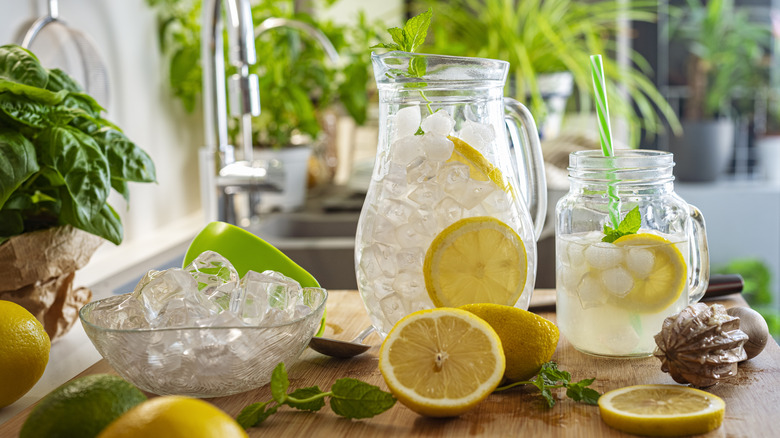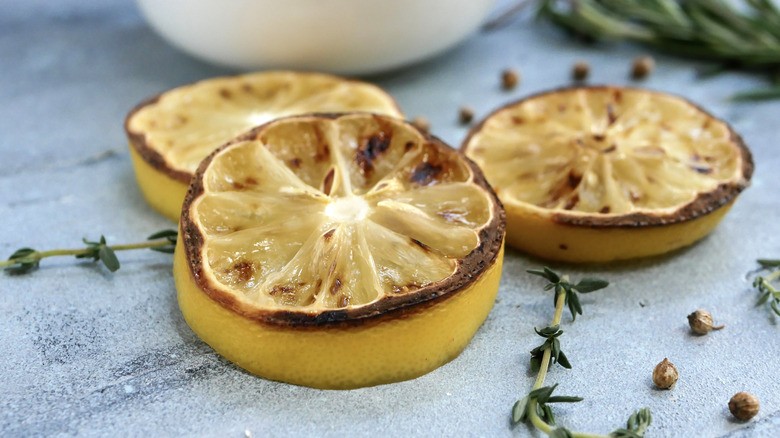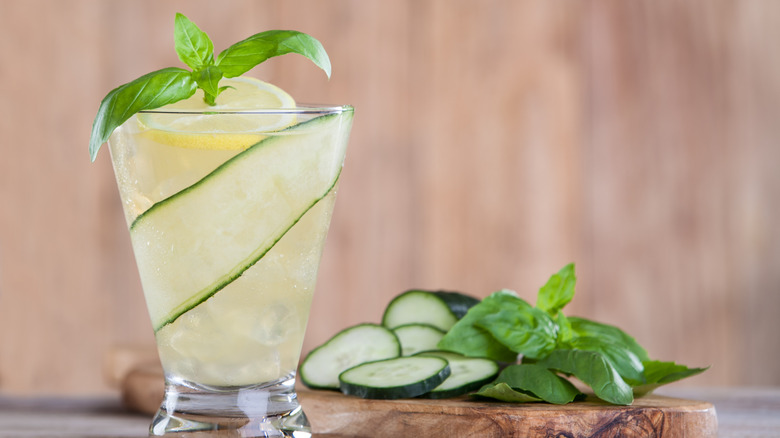Roasted Lemons Make The Best Lemonade, Period
Most home-kitchen chefs know that caramelizing a meal component leads to sugary delight — whether in sweet desserts or savory produce, from onions to bananas. But lemons? Yes indeed, those tart and tangy pucker-perfect citrus fruits thrive when caramelized, leading to the best lemonade ever.
Rather than a tedious hands-on process, caramelizing lemons for the purpose of making lemonade simply involves roasting them. You only need a hot oven, a roasting pan, and about 20 to 25 minutes. The result is a multi-dimensional flavor profile that's rich, sweet, and slightly smoky with a toasty citrus tang.
As with other fruits or vegetables, caramelizing a pan of sliced lemons brings out the natural sugars tucked inside the skins and pulp. It slowly breaks down those sugars, releasing natural chemicals that condense and create that toasty caramel flavor and color we all love. They're still lemons, however, so the tartness remains –– just on a smoother, deeper, less-acidic level that transforms lemonade in ways you can't imagine. You may never again return to a standard squeeze-and-add-sugar approach to homemade lemonade; yes, it's that good.
How to roast lemons for the best lemonade, period
There's no need to babysit lemons to bring out the sugars –– your oven will do the toasty work quite nicely. Preheat the oven to 400 degrees Fahrenheit while prepping the whole, fresh lemons. Use the same number of lemons you would for any other lemonade recipe, slicing them in half across the center and arranging them face-down on your roasting pan.
Spray or coat the pan with a small amount of oil, preferably one bearing a fairly neutral taste and a relatively high smoke point to avoid over-burned lemons. You do want the edges to char, however, so pop the pan into the hot oven and let them sizzle for roughly 20 to 25 minutes. For a truly transformative lemonade experience, let them smoke just a tiny bit for grilled flavor in liquid form.
After getting more comfortable with roasting and caramelizing lemons, by all means, pop them on the grill, or even try a more traditional stovetop browning-slash-caramelizing method. But you'll likely find that roasting them gives a similar effect that's easy and fuss-free.
Now that you have the roasted, charred, caramelized lemons ready to go, make sure they're cool enough to handle, then filter and squeeze out that lusciously sweet, smooth juice into a glass pitcher. Proceed with your favorite lemonade recipe as usual, but you might want to take it easy on the sugar. It's likely the lemons will be much sweeter than uncooked ones, requiring way less added sugar.
Roasted lemonade garnishes
It's hard to beat an icy-cold glass of standard lemonade, especially one made with roasted lemons. But it's still fun to spiff things up with some pretty (and tasty) garnishes. That goes double for lemon-based cocktails or mocktails made with your newly embraced smoky, charred, or caramelized lemons.
Mint leaves and rosemary sprigs are longtime go-to garnishes for lemonade, and they can even be lightly roasted as well to bring out their flavor essences. But make sure the sprigs or leaves don't dry out, as they'll crumble into your glass instead of sitting pretty on top.
Lavender also works well with roasted lemonade or lemon-based cocktails. You'll get the best flavor enhancement when drying the lavender first and steeping it in hot water, then mixing the fragrant lavender water with the squeezed roasted lemon juice. Cane sugar instead of the white granulated kind adds another layer of caramel complexity to your glass.
Other herb garnishes to play around with include sweet or Thai basil leaves for a peppery touch, and thyme or cilantro to complement the rich caramelized tones in the lemons. Powdered spices add intriguing surprise to charred or roasted lemonade, including earthy favorites such as cumin and smoked paprika. Lighten things up a bit by sprinkling your lemonade creations with garam masala or turmeric for a healthy and flavorful drink.



